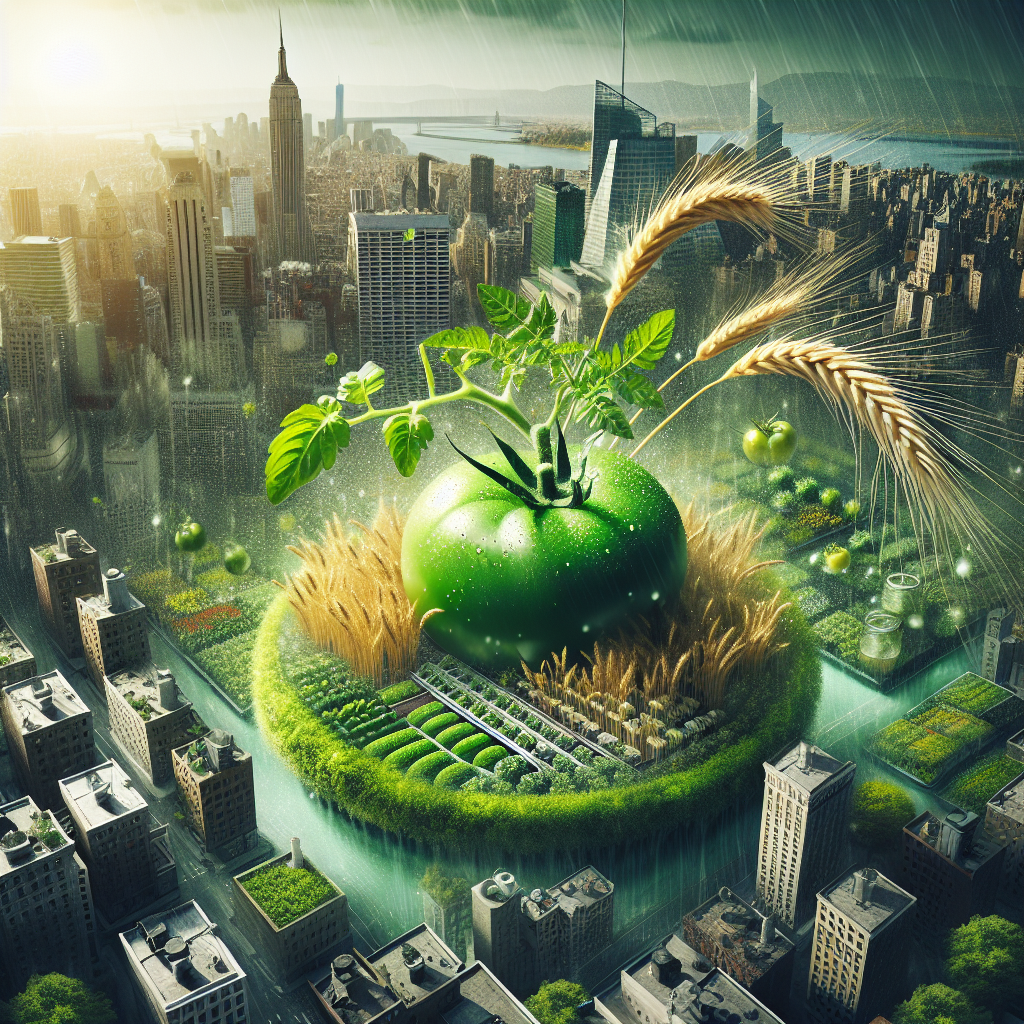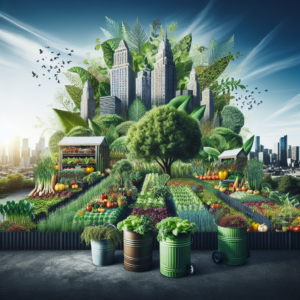
Imagine a world where urban farming not only provided fresh, nutritious food for communities, but also played a crucial role in reducing the risks of stormwater runoff and flooding. Sound too good to be true? Well, it turns out, urban farming has the potential to do just that. By implementing sustainable agricultural practices within cities, we can effectively manage stormwater and mitigate the adverse effects of flooding. In this article, we will explore the fascinating impact of urban farming on reducing stormwater runoff and flooding, and how this innovative solution is changing the game for urban environments worldwide. Get ready to discover the unexpected benefits of growing greens amidst the concrete jungle!
Impact of Urban Farming on Reducing Stormwater Runoff and Flooding
Urban farming has gained significant attention in recent years for its potential to address various environmental challenges, including stormwater runoff and flooding. By integrating agricultural practices into urban landscapes, cities can effectively reduce the impact of stormwater runoff and mitigate the risk of flooding. This article explores the various ways in which urban farming contributes to the reduction of stormwater runoff and flooding, as well as the challenges and limitations faced in implementing these strategies.

Definition of Stormwater Runoff and Flooding
Stormwater runoff refers to the excess water that flows over the surface of the land during rainfall or snowmelt events. This water is unable to infiltrate into the soil due to impervious surfaces, such as roads, parking lots, and buildings, which prevent natural absorption. As a result, stormwater runoff accumulates and can overwhelm drainage systems, leading to flooding in urban areas. Flooding, both temporary and prolonged, can cause significant damage to infrastructure, properties, and even endanger human lives.
The Role of Urban Farming in the Water Cycle
Urban farming plays a crucial role in the water cycle by promoting natural water infiltration and reducing stormwater runoff. Traditional urban landscapes with high percentages of impervious surfaces hinder the natural water cycle and disrupt the balance of water resources. Urban farming, on the other hand, introduces green spaces and vegetation into the cityscape, effectively increasing water absorption and infiltration capabilities.

Vegetative Cover and Soil Health
One of the primary ways in which urban farming reduces stormwater runoff is through the establishment of vegetative cover and improvements in soil health. Vegetation, such as crops, trees, and grass, acts as a natural sponge, absorbing rainfall and reducing the volume of runoff. Furthermore, the roots of these plants penetrate the soil, creating channels for water infiltration and increasing soil porosity.
Additionally, urban farming promotes soil health through practices like composting and organic farming. Healthy soils have better water-holding capacity, allowing them to store excess rainfall and prevent runoff. Moreover, nutrient-rich soils facilitate plant growth and increase vegetation density, enhancing the natural capacity of urban farming to manage stormwater.
Rainwater Harvesting Techniques
Rainwater harvesting is another effective technique employed in urban farming to minimize stormwater runoff and flooding. By capturing and storing rainwater, urban farmers can regulate its release and prevent overwhelming drainage systems during heavy precipitation events. Rainwater harvesting systems range from simple rain barrels to more sophisticated cisterns, which can collect and store substantial amounts of water for agricultural use.

Green Roofs and Rain Gardens
Green roofs and rain gardens are innovative urban farming practices that contribute to stormwater management. Green roofs involve the installation of vegetation on rooftops, allowing for rainwater retention and evapotranspiration, significantly reducing runoff. These living roofs also act as insulators, improving energy efficiency and mitigating the urban heat island effect.
Rain gardens are designed depressions filled with native plants that capture and absorb stormwater runoff. They function as natural filters, removing pollutants and contaminants from the water before it infiltrates into the soil. Besides reducing runoff, rain gardens enhance biodiversity, create habitat for pollinators, and beautify urban spaces.
Permeable Pavement and Bioswales
In urban farming, the use of permeable pavement and bioswales effectively reduces stormwater runoff and flooding. Permeable pavement, unlike traditional impermeable surfaces, allows water to pass through the surface and infiltrate into the ground, preventing runoff. This innovative technology utilizes porous materials, such as pervious concrete or asphalt, which can absorb a significant volume of rainfall.
Bioswales, on the other hand, are vegetated channels or depressions located near impervious surfaces, specifically designed to capture and slow down stormwater runoff. By directing runoff towards the vegetation, bioswales facilitate water infiltration and assist in pollutant removal. These green drainage systems also enhance urban aesthetics and promote biodiversity within the city.

Urban Agriculture and Water Infiltration
The integration of urban agriculture into cities promotes water infiltration by restoring natural hydrological processes. Through practices like contouring, terracing, and swale construction, urban farmers create topographical modifications that encourage water to infiltrate into the soil, rather than running off the land surface. These techniques mimic natural landscapes and promote the absorption of rainfall, thus reducing stormwater runoff and flooding risks.
Reducing Impervious Surfaces
Urban farming’s impact on stormwater runoff and flooding is also achieved by reducing the extent of impervious surfaces in urban areas. Impervious surfaces, such as concrete and asphalt, contribute significantly to stormwater runoff by preventing natural absorption. By converting underutilized spaces, such as vacant lots or unused rooftops, into productive urban farms, cities can decrease the overall percentage of impermeable surfaces, allowing for increased water infiltration and reduced runoff.

Benefits of Urban Farming on Stormwater Runoff and Flooding
The benefits of urban farming in reducing stormwater runoff and flooding are numerous. By increasing the vegetative cover and promoting soil health, urban farming improves water absorption capacity, reducing the volume and velocity of stormwater runoff. This, in turn, mitigates the risk of flooding, safeguards urban infrastructure, and protects vulnerable communities from the damaging effects of excessive rainfall.
Furthermore, the implementation of rainwater harvesting techniques, green roofs, and rain gardens maximizes water retention within urban areas, minimizing the strain on drainage systems during heavy precipitation events. These practices also enhance water quality by removing pollutants and contaminants from stormwater runoff, contributing to the overall improvement of local water resources.
Challenges and Limitations of Urban Farming in Mitigating Stormwater Runoff and Flooding
While urban farming holds great potential in reducing stormwater runoff and flooding, several challenges need to be addressed. Limited space availability and land use constraints can pose obstacles to implementing large-scale urban farming initiatives. Additionally, the cost of implementing stormwater management techniques, such as permeable pavement or green infrastructure, may deter widespread adoption.
Furthermore, the effectiveness of urban farming in flood mitigation depends on local climate conditions, rainfall patterns, and soil characteristics. In some areas, heavy rainfall events may overwhelm even the most advanced stormwater management systems, necessitating complementary strategies such as stormwater detention ponds or underground storage tanks.
In conclusion, urban farming plays a vital role in reducing stormwater runoff and flooding in urban areas. Through the promotion of vegetative cover, improvements in soil health, and the implementation of innovative stormwater management techniques, cities can enhance water infiltration capacities and minimize the impact of heavy rainfall events. The benefits of urban farming on stormwater runoff and flooding are far-reaching, providing environmental, social, and economic advantages to communities. Though certain challenges and limitations exist, the continued integration of urban farming into urban landscapes promises a more sustainable and resilient future.







